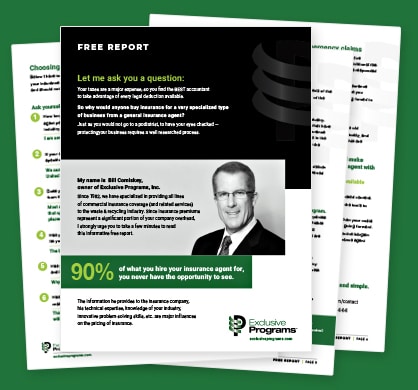June 27, 2024
Understanding how much is workers comp insurance in Florida is crucial for business owners, especially those in high-risk industries like waste and recycling. For garbage collection companies in Florida, managing insurance costs while ensuring adequate coverage is essential. This guide will provide a comprehensive overview of how much workers comp insurance in Florida costs and the factors that influence these rates. Additionally, we will explore the importance of obtaining a workers comp certificate of insurance.
What Is Workers Compensation Insurance?
Workers compensation insurance provides medical benefits and wage replacement to employees who are injured on the job. In Florida, this type of insurance is mandatory for most businesses, including those in the waste and recycling industry. It ensures that employees receive the necessary medical care and financial support in the event of a workplace injury, while also protecting employers from potential lawsuits.
How Much Is Workers Comp Insurance in Florida?
Understanding how much is workers comp insurance in Florida depends on several factors, including the industry, the number of employees, and the company’s claims history. For garbage collection companies, understanding these variables is key to estimating and managing insurance expenses.
Factors Influencing Workers Comp Insurance Costs
- Industry Classification: The waste and recycling industry is classified as high-risk due to the nature of the work. This classification significantly impacts the cost of workers comp insurance, as higher-risk industries typically face higher premiums.
- Payroll Size: The total payroll of a company directly influences the cost of workers comp insurance. The higher the payroll, the higher the premium, as the potential liability increases with more employees.
- Claims History: Companies with a history of frequent claims or high-value claims will face higher premiums. Maintaining a good loss ratio by implementing effective safety measures can help reduce insurance costs over time.
- Experience Modification Rate (EMR): The EMR is a factor that reflects a company’s claims history compared to others in the same industry. A lower EMR indicates fewer claims and results in lower premiums, while a higher EMR suggests a higher risk, leading to increased costs.
Average Costs for Garbage Collection Companies
For businesses in the waste and recycling industry, particularly garbage collection companies, the average cost of workers comp insurance in Florida can range from $3 to $6 per $100 of payroll. However, this is a general estimate, and actual costs may vary based on the specific factors mentioned above.
Obtaining a Workers Comp Certificate of Insurance
A workers comp certificate of insurance is a document that proves a business has workers compensation coverage. This certificate is often required by regulatory authorities, clients, and contractors to ensure that a company complies with state laws and provides adequate protection for its employees.
Importance of a Workers Comp Certificate of Insurance
For garbage collection companies, having a workers comp certificate of insurance is crucial for several reasons:
- Compliance: It ensures that the business complies with Florida’s workers compensation laws, avoiding potential fines and legal issues.
- Client Trust: Clients and contractors often require proof of insurance before entering into contracts. A workers comp certificate of insurance demonstrates that the business is responsible and trustworthy.
- Employee Assurance: It provides peace of mind to employees, knowing they are protected in the event of a workplace injury, which can enhance morale and productivity.
Strategies to Reduce Workers Comp Insurance Costs
For garbage collection companies looking to manage and reduce their workers comp insurance costs, the following strategies can be effective:
Implementing Safety Programs
Investing in comprehensive safety programs can significantly reduce the likelihood of workplace injuries. Regular training sessions, safety audits, and strict adherence to safety protocols can help maintain a safe working environment and reduce the number of claims.
Managing Payroll
Carefully managing payroll and categorizing employees accurately can help ensure that you are not overpaying for workers comp insurance. Working with an experienced insurance provider can help identify potential savings in payroll management.
Maintaining a Good Loss Ratio
By focusing on reducing the frequency and severity of claims, businesses can improve their loss ratio. Implementing effective risk management practices and promptly addressing safety concerns can contribute to a lower loss ratio and, consequently, lower premiums.
Reviewing Insurance Policies Regularly
Regularly reviewing and comparing insurance policies can help ensure that you are getting the best possible rates. Working with a knowledgeable insurance broker, like Exclusive Programs, Inc., can provide access to a wide range of insurance carriers and exclusive products that may offer better coverage at competitive prices.
Understanding how much workers comp insurance in Florida costs and the factors that influence these rates is essential for business owners in the waste and recycling industry. By implementing effective safety measures, managing payroll efficiently, and maintaining a good loss ratio, garbage collection companies can manage their insurance expenses while ensuring adequate coverage for their employees.
If you are looking to optimize your workers comp insurance costs and ensure comprehensive coverage, contact Exclusive Programs, Inc. today. Our team of experts is dedicated to helping you navigate the complexities of insurance and find the best solutions for your business needs.


